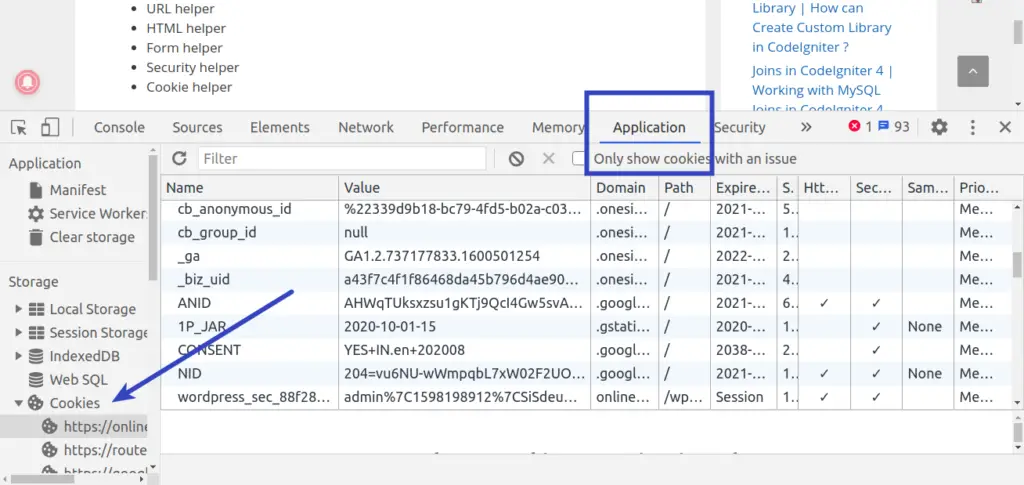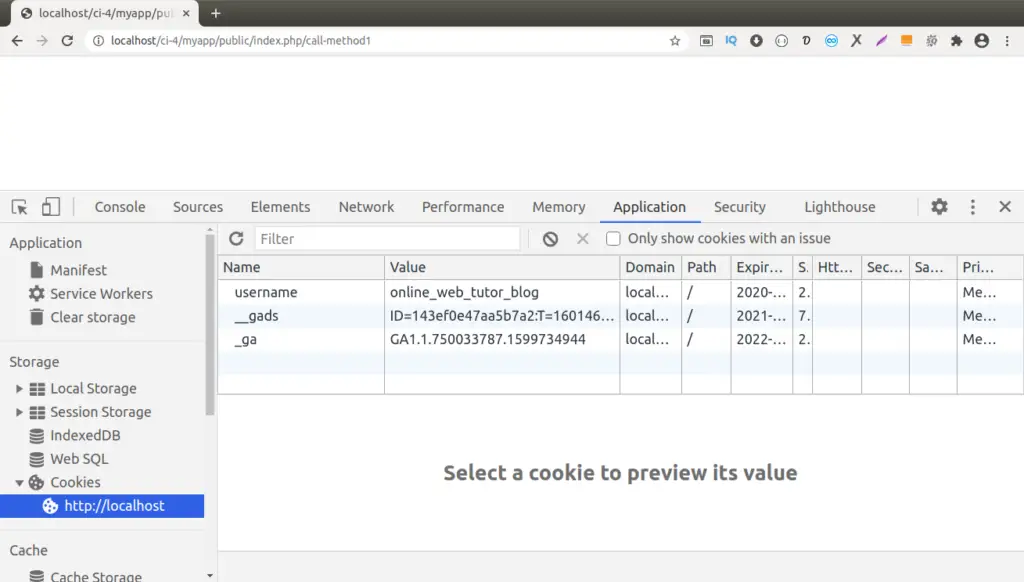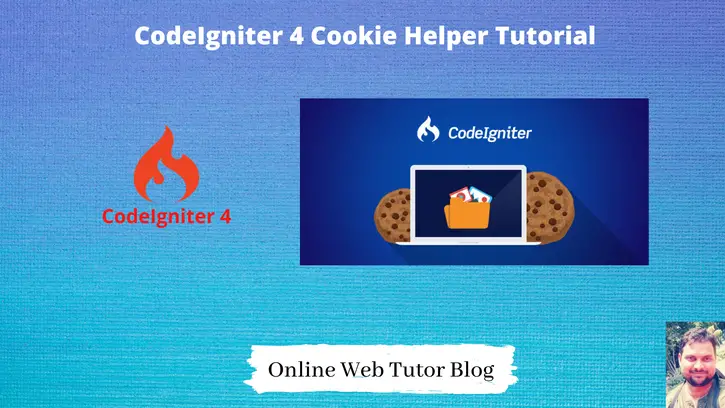Inside this article we will see the concept i.e CodeIgniter 4 How To Work with Cookie Helper Tutorial. Article contains the classified information about Working with CodeIgniter 4 Available Cookie Helper Functions.
CodeIgniter 4 is an open source PHP framework. This PHP framework we have several features available including latest modules.
Helpers are those sections which is provided by framework for specific functions. Either we can use application provided default helpers as well as we can create custom helpers too to manage applications.
Learn More –
- Concept of Seeders in CodeIgniter 4 Tutorial
- Concept of Trait in CodeIgniter 4 Tutorial with Example
- Create Custom 404 Page in CodeIgniter 4 | Page Not Found
- Create Custom Command in CodeIgniter 4
Let’s get started.
What are helpers in CodeIgniter?
Helpers are the standalone functions which helps to complete specific task. Actually helpers are available in CodeIgniter application to reuse the block codes.
Here are some default helpers of CodeIgniter 4 –
- URL helper
- HTML helper
- Form helper
- Security helper
- Cookie helper
You can check all available helpers at this official document of codeigniter 4.
Inside above list of helpers, we can see a Cookie helper is there. So, we understood what basically it is. Now, let’s see How can we work with Cookie helper in CodeIgniter 4?
What is Cookie in Web application?
Cookie is a part of information which is injected by application to store at client side browser. Basically the purpose of cookie is to recognize and/or manage the client activity at browser.
Cookie variables and their respective storing values will be created at server side scripting code logic and injected to client side browser. Each time when user requests to the server, cookie variables embedded with request. In this way, cookie can be received at server.
Where we find cookie variables at client system ? Have a look this image.

- Right click and click on Inspect
- Go to Application tab of Chrome, in different browsers this tab may be with the different name.
- Left bottom we have cookies section, where we should see domain wise cookie details.
- Cookie details contain several information like name, value, domain, path, expire etc.
CodeIgniter 4 Installation
To create a CodeIgniter 4 setup run this given command into your shell or terminal. Please make sure composer should be installed.
composer create-project codeigniter4/appstarter codeigniter-4Assuming you have successfully installed application into your local system.
Environment (.env) Setup
When we install CodeIgniter 4, we will have env file at root. To use the environment variables means using variables at global scope we need to do env to .env
Either we can do via renaming file as simple as that. Also we can do by terminal command.
Open project in terminal
cp env .envAbove command will create a copy of env file to .env file. Now we are ready to use environment variables.
Enable Development Mode
CodeIgniter starts up in production mode by default. You need to make it in development mode to see any error if you are working with application.
Open .env file from root.
# CI_ENVIRONMENT = production
// Do it to
CI_ENVIRONMENT = developmentNow application is in development mode.
Cookie Helper Available Functions
To use cookie helper in CodeIgniter 4 application, we have to first load this helper in application. Then we will have access to use it’s available functions.
According to official documentation, we have these available functions –
- set_cookie($name, $value, $expire, $domain, $path, $prefix, $secure $httpOnly)
- get_cookie($key_name)
- delete_cookie($name, $domain, $path, $prefix)
set_cookie function is used to set value in cookie.
get_cookie is the function used to get cookie value which has been set by set_cookie function.
delete_cookie function removes cookie when we pass cookie key into it.
How to load Cookie helper in CodeIgniter 4?
To load Cookie helper, we have two ways in CodeIgniter 4.
- By using BaseController.php
- Load in specific controller file
By using BaseController.php
BaseController.php is the parent controller class for every controller in CodeIgniter 4. This file we can find at /app/Controllers/BaseController.php
Open up this file and find this line of code into file protected $helpers = []; Needs to add cookie helper there.
So updated code will be something protected $helpers = [‘cookie’];
Loading in Specific controller
To load in any specific controller, let’s understand by taking a controller. Suppose we have Home.php controller file.
<?php
namespace App\Controllers;
class Home extends BaseController{
public function index()
{
helper("cookie");
return view('welcome_message');
}
}
Usage of Cookie helper functions in Application
To store value in cookie, we need to use set_cookie() function.
set_cookie("username", "online_web_tutor_blog", 3600); username is the cookie key name. online_web_tutor_blog is the value of cookie. 3600 is number of seconds. It indicates that cookie value what we have stored will expire after 3600 seconds.
To get cookie value what we have stored at client side, we use get_cookie() function.
get_cookie("username");This returns the value online_web_tutor_blog because a bit step behind we have stored this.
To remove cookie value from client site we use delete_cookie() function. We need to pass cookie key inside it.
delete_cookie("username");Cookie value also automatically removed from browser when they expire.
<?php
namespace App\Controllers;
class Home extends BaseController{
public function index()
{
helper("cookie");
// store a cookie value
set_cookie("username", "online_web_tutor_blog", 3600);
// get cookie value
get_cookie("username");
// remove cookie value
delete_cookie("username");
return view('welcome_message');
}
}Have a look how application stores cookie value at client side.

For more information Click here to go to official website of CodeIgniter
To learn about Session Service in CodeIgniter 4, Click here.
We hope this article helped you to learn about CodeIgniter 4 How To Work with Cookie Helper Tutorial in a very detailed way.
If you liked this article, then please subscribe to our YouTube Channel for PHP & it’s framework, WordPress, Node Js video tutorials. You can also find us on Twitter and Facebook.
Read more